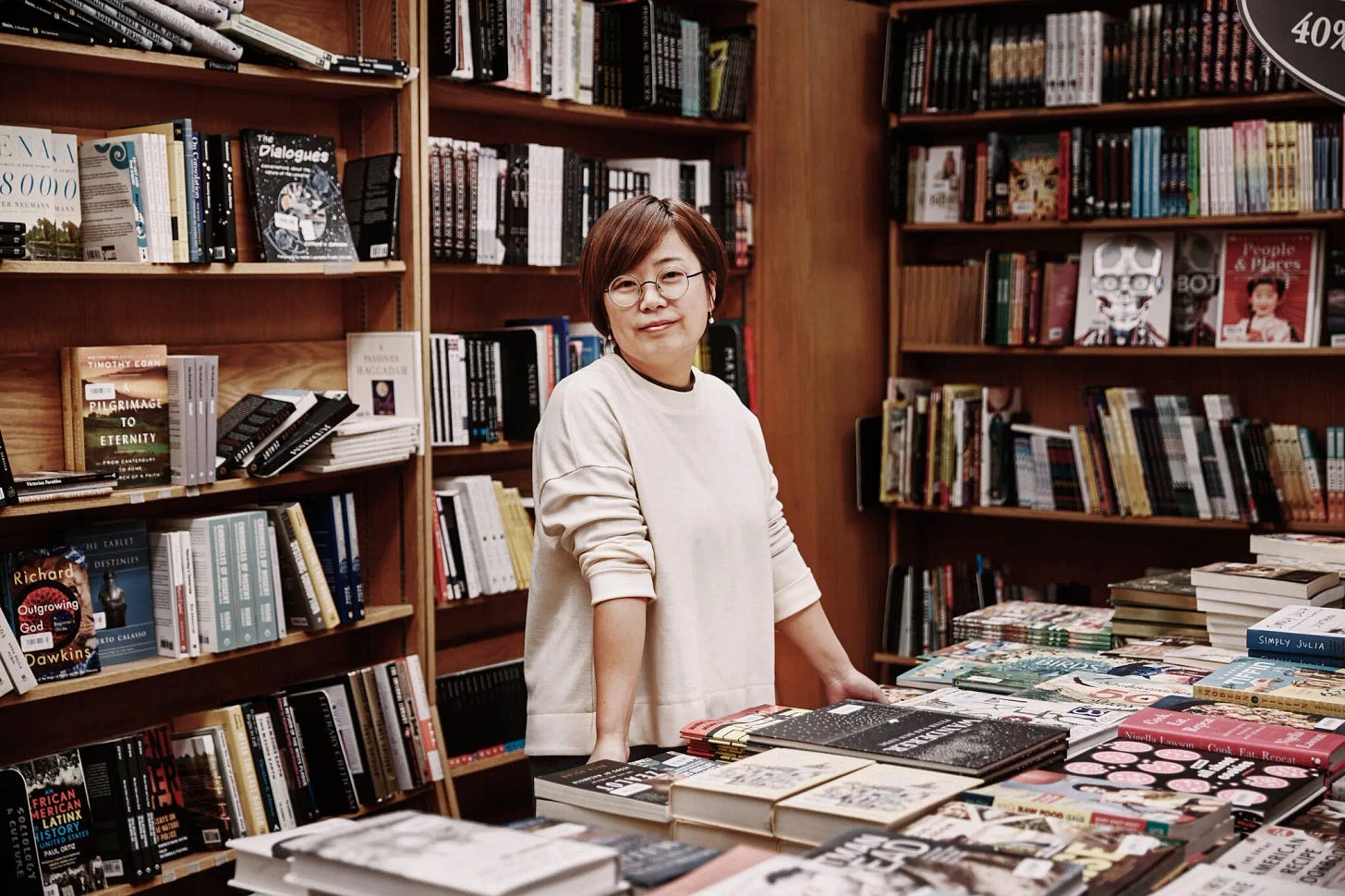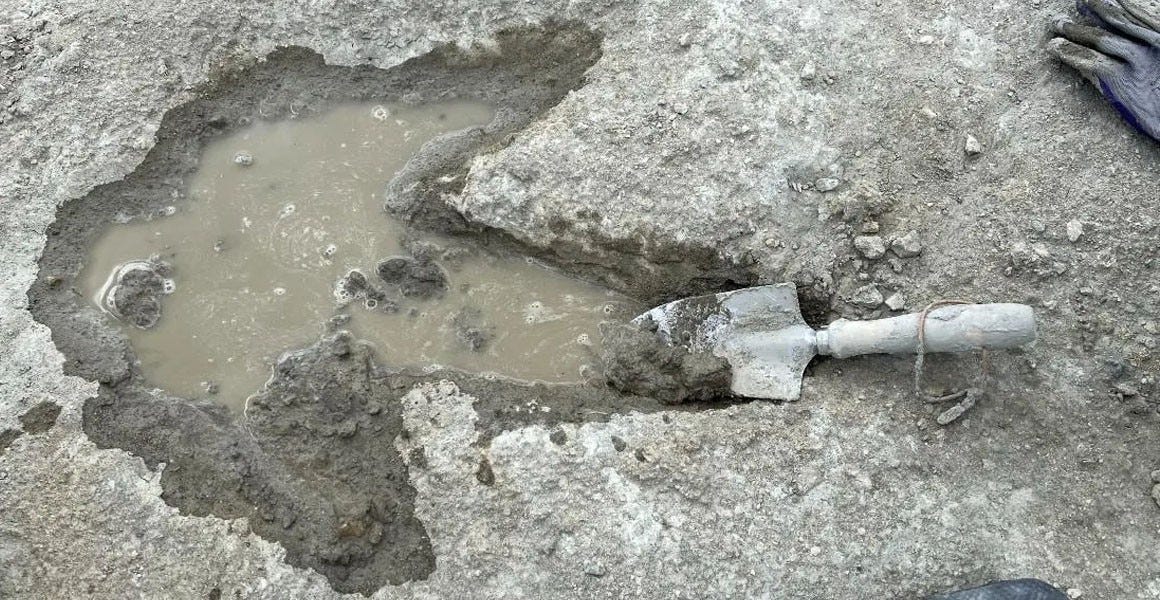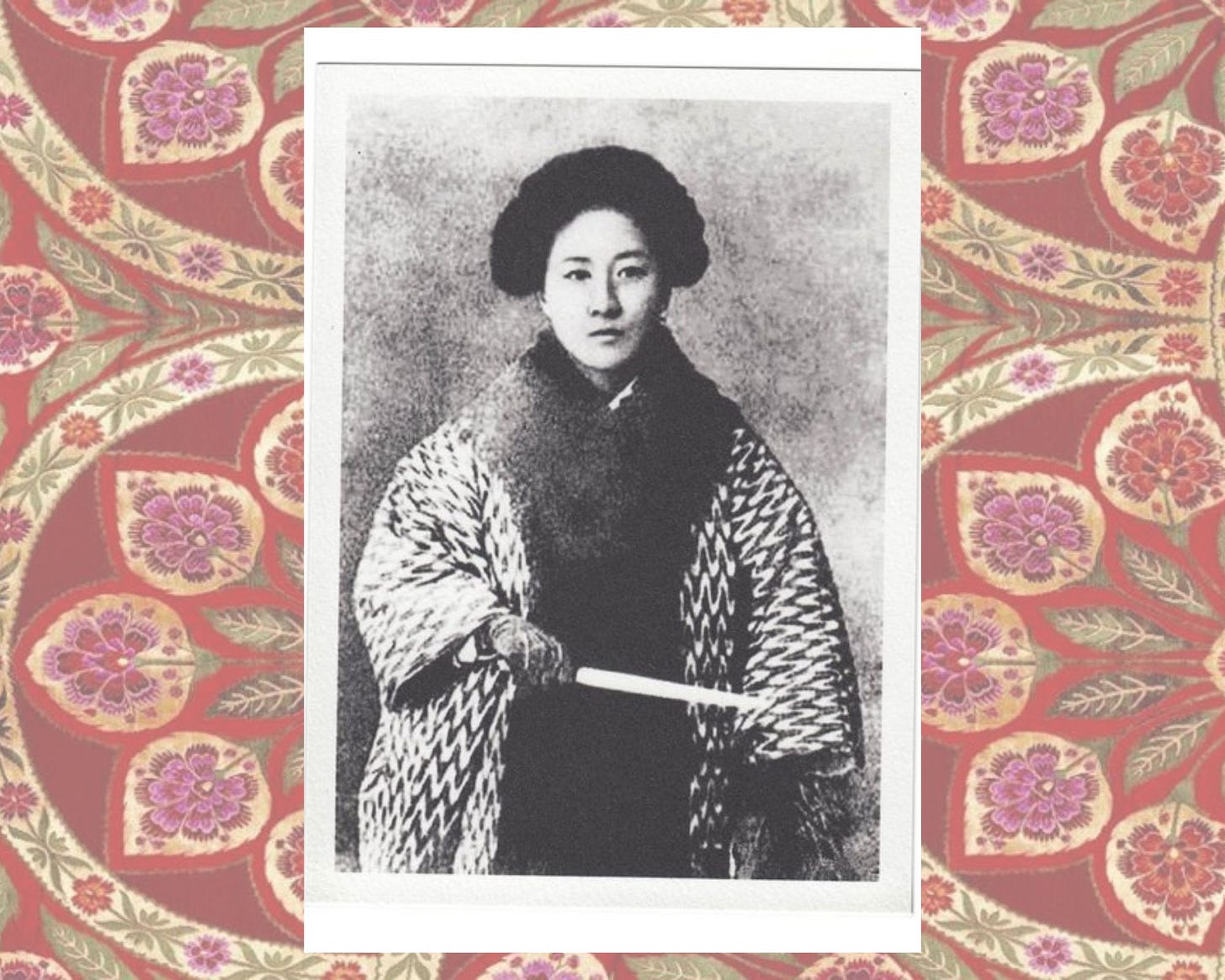All Chicago's city buildings now use 100% clean power.
And Chinese bookstores are opening around the world.
“The Intersection” is your Monday, Wednesday, and Friday briefing on global affairs, business, culture, and design—offering fresh insights through the lenses of sustainable development, women-centered perspectives, and emerging global trends. The aim? To keep you informed, curious, and always ready with a compelling conversation starter at the dinner table.
How are we doing? I am (once again) distressed by the extreme weather events and natural disasters unfolding worldwide—from Los Angeles to Tibet. A report I read recently about the climate crisis wreaking havoc on Earth’s water cycle kept me up last night, as did my current read, I Love Russia: Reporting from a Lost Country.
As I curate these issues of The Intersection, I strive to balance the weight of global crises with stories of positive change, alongside topics of broader cultural and intellectual interest. At times, I wonder if I am incredibly strange, with a curiosity that spans from the complexities of the Chinese economy to Pucci’s next fashion show, the latest discoveries of dinosaur footprints, and Austria’s political turbulence. But in my view, these seemingly disparate topics all contribute to a fuller understanding of our world in 2025. A well-rounded perspective must embrace both the heavy and the light, and everything in between. This is what these newsletters aim to help you see.
Austria’s far-right party (Austria’s Freedom Party) gets a mandate to try to lead a government for the first time since World War II. This comes after Austrian Chancellor Nehammer said on Saturday he will resign after talks on forming a new government failed.
Indonesia becomes the latest BRICS member. BRICS was formed by Brazil, Russia, India, and China in 2009, and South Africa was added in 2010. Last year, the alliance expanded to embrace Iran, Egypt, Ethiopia, and the United Arab Emirates. Saudi Arabia has been invited to join but has not yet done so.

Independent bookstores may have faced closures in China and Hong Kong, but they’re finding new life in cities worldwide. Once vibrant hubs of public discourse, Chinese urban centers have seen such spaces stifled over the past decade, as civic participation is increasingly discouraged by the CCP. In response, a growing number of Chinese citizens have sought freedom abroad, creating opportunities to connect and foster dialogue beyond the reach of government oversight. Enter Anne Jieping Zhang, a mainland-born journalist who spent two decades in Hong Kong before relocating to Taiwan during the pandemic. Zhang is the founder of Nowhere, a chain of Chinese-language bookstores with locations in Chiang Mai, Taipei, and Amsterdam. These spaces are more than just bookshops; they are incubators for a new kind of Chinese public life—one that thrives beyond China's borders. The Nowhere bookstores issue "passports" to their valued customers, calling them citizens rather than members, reflecting their mission to unite curious minds. “I don’t want these bookstores to only be for dissidents and young rebels,” says Zhang, “but for any Chinese person who is curious about the world.” This ethos has made Nowhere a haven for ideas, imagination, and the shared hope of a different future for China.
On New Year's Eve, President Xi Jinping delivered his annual address emphasizing the resilience of China’s economy, though the figures tell a more restrained story. In 2024, China recorded a 4.9% increase in GDP, a decline from 2023's 5.2%. While 4.9% remains enviable compared to many developed economies, it falls short of the double-digit growth rates China boasted in the 2000s, when annual expansion often exceeded 10%, peaking at around 13% in some years. Late-year stimulus measures, including the first significant pay raise for civil servants in years, helped stabilize growth, but challenges persist. A prolonged property market slump, mounting local government debt, and weak consumer confidence continue to weigh heavily, while youth unemployment remains alarmingly high. China's central bank is expected to ease borrowing conditions further, hoping to counteract the fallout from a housing market slump that has seen numerous property firms collapse.
On foreign policy, Xi reiterated his uncompromising stance on Taiwan, declaring that “no one can stop” unification and refusing to rule out the use of force. Taiwan’s critical role in semiconductor manufacturing only heightens its significance in US-China tensions, with Washington serving as the island’s key strategic ally and largest arms supplier.
China’s slowing growth and assertive rhetoric reflect the balancing act of navigating domestic and geopolitical challenges as the world's second-largest economy faces an increasingly uncertain future.
Rice sustains half the world’s population, yet for many farmers, cultivating it remains a gamble. One in five sacks is lost to pests, disease, and extreme weather. Enter Soj Gamayon, a 22-year-old Filipino whose AI-powered app, AgriConnect, offers a solution. Winner of the Red Bull Basement World Final in Tokyo, Gamayon’s app uses a traffic-light warning system to simplify complex data, guiding farmers in managing crop risks. His aim? To tackle the $264 million in annual losses that burden the industry. With rice contributing 12% of the Philippines’ GDP, climate change and outdated risk assessments are taking their toll, causing farmers to lose 30% of potential yield annually. Gamayon’s innovation is poised to help reverse this trend.
Laura Weir has been appointed the new CEO of the British Fashion Council (BFC), the organisation responsible for London Fashion Week and a prominent advocate for British fashion globally. Currently the executive creative director at Selfridges, Weir succeeds Caroline Rush CBE, who steps down after 15 years. A seasoned fashion journalist, Weir joined Selfridges in 2023 to oversee its creative and marketing efforts. At the BFC, Weir aims to bolster support for both emerging and established designers, working with industry partners and government bodies to elevate British fashion’s global influence. As a not-for-profit, the BFC is focused on nurturing responsible growth, championing creativity, and driving innovation through its Institute of Positive Fashion. A long-time admirer of British fashion and London Fashion Week—often overshadowed by its global counterparts—I look forward to seeing how Weir steers the organisation through this tempestuous period for the industry. With challenges brought on by Brexit, the pandemic, and the collapse of Matches, the road ahead will require both innovation and resilience.

In Oxfordshire, the UK has unearthed its largest-ever dinosaur footprint site, dating back 166 million years. The discovery reveals five extensive trackways, with the longest stretching over 150 metres (!!!). Four of these trails were left by a massive, long-necked, herbivorous sauropod, most likely the Cetiosaurus—an 18-metre-long relative of the more known Diplodocus. This find offers a rare glimpse into the prehistoric past, showcasing the scale and movement of these ancient creatures. I wish these kinds of stories were our breaking news…Also, imagine being the person who finds these?! They were first found by quarry worker Gary Johnson when he felt ‘unusual bumps’ a few metres apart while driving his digger. Amazing.
All of Chicago's city buildings now use 100% clean power. This is huge! I am so proud! All of the city’s more than 400 municipal buildings are now powered by renewable energy. This includes 98 fire stations, two international airports, and two of the world’s largest water treatment plants. The move is made possible by Illinois’ largest and newest solar farm, the Double Black Diamond Solar project. Located in central Illinois, it is now the largest solar installation east of the Mississippi River, generating enough power to supply over 100,000 homes. Chicago has committed to purchasing half of the farm’s output, covering approximately 70% of the city's municipal energy needs. The remaining 30% will be sourced through renewable energy credits. This shift is expected to reduce the city’s carbon footprint by around 290,000 metric tons of CO2 annually—equivalent to removing 62,000 cars from the road.
In addition, Chicago has secured a $400,000 annual investment in clean energy workforce training through Constellation and Swift Current, focusing on expanding opportunities for women in union construction and manufacturing jobs in partnership with Chicago Women in Trades. With this bold step, Chicago's renewable energy deal now stands as one of the largest in the country, second only to Houston’s, but notable for the amount of new renewable power added to the grid.
Pucci has chosen Portofino as the location for its next runway show on April 4. This follows the trend of luxury brands selecting Italy as the backdrop for their showcases. Chanel will kick off the cruise 2026 season with a show on Lake Como on April 29, followed by Gucci in Florence on May 15 and Dior in Rome on May 27. Max Mara will host a two-day resort 2026 event, including a runway show, in Naples on June 16 and 17. As a longtime admirer of Pucci’s vibrant designs (there is some exceptional Pucci available on The RealReal), I believe Portofino is the perfect setting to reflect the brand’s glamorous yet effortlessly chic seaside allure.
In recognition of tomorrow’s national day of mourning for Jimmy Carter, it’s worth reflecting on his prescient leadership on environmental issues. Long before “climate change” entered the American vernacular, Carter championed green policies, using the colour as a symbol of his love for nature during his presidential campaign. He called for reductions in greenhouse gas emissions 35 years before the Paris Accords and famously established the Department of Energy. Carter’s forward-thinking approach made headlines when he installed solar panels on the White House—an initiative undone by Ronald Reagan but emblematic of Carter’s vision. Decades later, he returned to this cause, installing nearly 4,000 solar panels on his family farm in Plains, Georgia, in 2017. The installation generates enough power for more than half the town, a testament to his enduring commitment to sustainability.
Here’s a useful linguistic nugget: there’s a word for offering opinions on topics beyond one’s expertise. The Latin expression sutor, ne ultra crepidam—“Shoemaker, not beyond the shoe”—serves as a caution against overstepping one’s knowledge. This phrase inspired the term ultracrepidarianism, referring to the habit of giving advice or opinions on matters outside one’s expertise. Next time someone ventures into unfamiliar territory with misplaced confidence, you’ll know exactly what to call them—tactfully, of course.
Qiu Jin (1875-1907) was a revolutionary, feminist, and writer whose legacy as one of China’s pioneering feminists and martyrs endures to this day. Born into a wealthy and educated family in Zhejiang province, Qiu was exposed to progressive ideologies from a young age. Encouraged by her family, she pursued education, which was rare for women in late 19th-century China. After studying abroad in Japan, Qiu became increasingly involved in revolutionary activities, calling herself the 'Female Knight-Errant of Jian Lake,' a nod to the traditionally male heroic figure of swordsmanship and self-sacrifice.
Defying the deeply rooted patriarchy, Qiu challenged societal norms by unbinding her feet, cross-dressing, and leaving her family to pursue an education and political activism. She became an outspoken advocate for women’s liberation, arguing that true equality required words and action. Her revolutionary spirit culminated in her beheading at 31 by imperial army forces who charged her with conspiring to overthrow the Manchu-led Qing government, marking her as a martyr for both feminism and republicanism.
Qiu’s poetry captured her defiance of gender roles, exemplified in the lines: “My body will not allow me / To mingle with the men / But my heart is far braver / Than that of a man.” Her commitment to the cause was absolute, believing that equality for women demanded personal sacrifice. As Hu Ying, a scholar of Chinese literature, remarked, “She argued that it wasn’t enough for women to just sit around and ask for equality. She believed you had to be willing to put your life on the line.”
That is all for today! Hope you have a great one! Let me know what you are reading in the comments.
Jennifer
xxx










You’re not alone in having these wide renaming interests - always love your newsletters’ breadth. History, current events, feminism, environmentalism, fashion, lifestyle, travel, literature. True renaissance woman!! 🔥